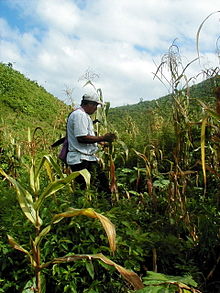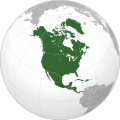Belize
Belize is a small nation on the eastern coast of Central America, on the Caribbean Sea bordered by Mexico to the northwest and Guatemala to the west and south. The country is a parliamentary democracy and constitutional monarchy which recognizes Queen Elizabeth II as Sovereign. The nation of Honduras is a near neighbour, 75 km away (47 miles) across the Gulf of Honduras to the east. The name is derived from the Belize River which Belize City, the former capital and largest city, is also named after. In Spanish it is usually called Belice. Belize was a British colony for more than a century, known as British Honduras, until 1973. It became an independent nation in 1981. Belize is a member of Caribbean Community (CARICOM) and the Sistema de Integracion Centro Americana (SICA) and considers itself to be both Caribbean, and Central American.
History
Main article: History of Belize
The Maya civilization spread over Belize between 1500 BC and AD 300 and flourished until about AD 900.
The first Europeans arrived in the area in the early 16th century and settlement began with British privateers and shipwrecked English seamen as early as1638.
The origin of the name Belize is unclear but one explanation is that it derives from the Spanish pronunciation of Wallace, the name of the pirate who created the first settlement in Belize in 1638. Another possibility is that the name is from the Maya word belix, meaning "muddy water", applied to the Belize River.
The early "settlement of Belize in the Bay of Honduras" grew from a few habitations located at Belize Town and St George's Caye,into a de-facto colony of the United Kingdom during the late 18th. In the early 19th century, under the name of British Honduras, the settlement became a Crown Colony in 1862.
British Honduras became a self-governing colony beginning in January 1964 and was renamed Belize in June 1973; it was Britain's last colony on the American mainland. George Price led the country to full independence in September 1981 after delays caused by territorial disputes with neighbouring Guatemala, which did not formally recognise the country until 1992.
Hurricane Hattie inflicted significant damage upon Belize in 1961. The government decided that having a coastal capital city that is below sea level was too much of a risk. Over the course of several years the British colonial government designed a new city at the exact geographic centre of the country, and in 1970 began the slow process of moving the governing offices to the capital of Belmopan.
Throughout Belize's history, Guatemala has claimed ownership of all or part of the territory. This claim is occasionally reflected in maps showing Belize as Guatemala's most eastern province. As of 2005, the border dispute with Guatemala remains unresolved.
Politics
Main article: Politics of Belize
Belize is a parliamentary democracy and a member of the Commonwealth of Nations. The head of state is currently Queen Elizabeth II, represented in the country by a governor-general, who must be a Belizean.
The primary executive organ of government is the cabinet, led by a prime minister who is head of government. Cabinet ministers are members of the majority political party in parliament and usually hold elected seats within it concurrently with their cabinet positions.
The bicameral Belizean parliament is the National Assembly, which consists of a House of Representatives and a Senate. The 29 members of the House are popularly elected to a maximum 5-year term. Of the Senate's eight members, five are chosen by the prime minister, two by the leader of the opposition, and one by the governor general on the advice of the Belize Advisory Council. The Senate is headed by a president, who is a nonvoting member appointed by the governing party.
Belize is a full participating member of the Caribbean Community (CARICOM).
Districts

- Main article: Districts of Belize
Belize consists of six districts:
- Belize District
- Cayo District
- Corozal District
- Orange Walk District
- Stann Creek District
- Toledo District
Geography

Main article: Geography of Belize
The north of Belize consists mostly of flat, swampy coastal plains, in places heavily forested. In the south is found the low mountain range of the Maya Mountains, of which the highest point in Belize is Victoria Peak at 1,160 m. Belize is located in between the Hondo and Sarstoon Rivers, with the Belize River flowing down in the centre of the country. All along the Caribbean coast are found coral reefs or cays. Belize is home to the longest barrier reef in the western hemisphere and the second longest in the world after the Great Barrier Reef.
The local climate is tropical and generally very hot and humid. The rainy season lasts from May to November and frequent natural hazards include hurricanes and flooding.
Economy
Main article: Economy of Belize

The small, essentially private enterprise economy is based primarily on agriculture, agro-based industry, and merchandising, with tourism (especially scuba diving) and construction assuming greater importance. Sugar, the chief crop, accounts for nearly half of exports, while the banana industry is the country's largest employer. Citrus production has become a major industry along the Hummingbird Highway.
The government's expansionary monetary and fiscal policies, initiated in September 1998, led to GDP growth of 6.4% in 1999 and 10.5% in 2000. Growth decelerated in 2001 to 3% due to the global slowdown and severe hurricane damage to agriculture, fishing and tourism. Major concerns continue to be the rapidly expanding trade deficit and foreign debt. A key short-term objective remains the reduction of poverty with the help of international donors.
More Belizians currently live abroad (mostly in the United States) than within the country itself, and a very significant portion of Belize's GNP comes from money sent by families living abroad.
Demographics
Main article: Demographics of Belize
Most Belizeans are of multiracial and multiethnic descent. About half the population is of mixed Maya and European descent (Mestizo); 25% are of African and Afro-European (Creole) ancestry (note: In Belize this is spelled "Kriol"); about 10% are Maya; and about 6% are Afro-Amerindian (Garifuna). The remainder includes European, Indian, Chinese, and Middle Eastern and North American groups.
English is the official language. Most Belizeans other than recent arrivals from neighbouring countries have at least a working knowledge of English. English or Kriol English predominates along the coast, and in the centre and south of the country. In the west and north, the Spanish language is more widely spoken. Spanish is the native tongue of about 50% of the people and is spoken as a second language by another 20%. The various Maya groups still speak Maya languages, and an English Creole dialect, similar to the Creole dialects of the English-speaking Caribbean Islands, is spoken by most. Some communities in southern Belize mostly speak Garifuna.
About 50% of the population is Roman Catholic; the Anglican Church and other Protestant Christian groups account for most of the remainder. About 5% belong to the German-/Plautdietsch-speaking Mennonite community. There are also some Jews.
Culture
Main article: Culture of Belize
National Holidays include Baron Bliss Day on 9 March; Commonwealth Day on the second Monday in March; Labour Day on 1 May; The Battle of St. George's Caye on 10 September; Independence Day on 21 September, Pan American Day on 13 October; Garifuna Settlement Day on 19 November; And Christmas on 25 December.
Miscellaneous topics
- Communications in Belize
- Foreign relations of Belize
- Languages of Belize
- Maya ruins of Belize
- Military of Belize
- Plants and animals of Belize
- Ports of Belize
- Transport in Belize
Material in some of these articles comes from the CIA World Factbook 2000 and the 2003 U.S. Department of State website.
Further Reading
- Belize Carlos Ledson Miller (novel)
- Belize: A Concise History P. A. B. Thomson
- Belize : Land of the Free By The Carib Sea Thor Janson
- Confederate Settlements in British Honduras Donald C., Jr. Simmons
- Fodor's Guide: Belize and Guatemala
- Formerly British Honduras: A Profile of a New Nation of Belize William David Stetzekorn
- Insight Guide: Belize Huw Hennessy
- Lonely Planet World Guide: Belize Carolyn Miller Caelstrom and Debra Miller
- The Making of Belize Anne Sutherland
- Moon Handbooks: Belize Chicki Mallan and Joshua Berman
- Our Man in Belize: A Memoir Richard Timothy Conroy
- The Rough Guide: Belize Peter Eltringham
- Time Among the Maya: Travels in Belize, Guatemala and Mexico Ronald Wright
- Thirteen Chapters of A History of Belize Assad Shoman
- Traveller's Wildlife Guide: Belize and Northern Guatemala Les Beletsky
External links
- Government of Belize - Official governmental site
- Belize Tourism Board - Official Tourism site
- Belize by Naturalight - Belize Portal
- Belizean Journeys - Belize Online Magazine
- Belize Forums - Community Forums on Belize
- Belize.Net - Belize Specific Search Engine
- Conservation in Belize - Nature Conservacy on Belize coral reef
- Map

